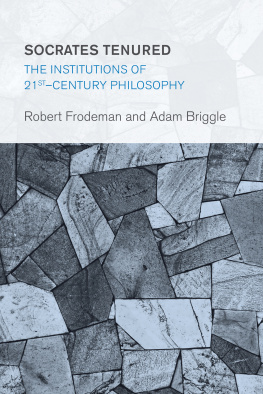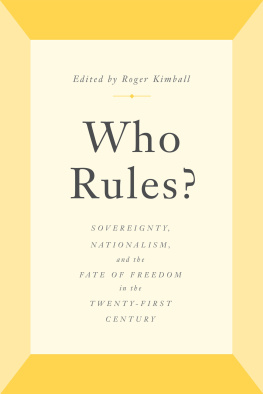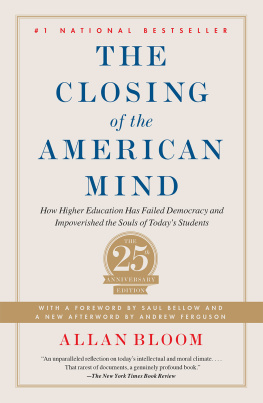Roger Kimball is co-editor and publisher of The New Criterion and president and publisher of Encounter Books. He contributes widely to periodicals in Britain and America and is a regular columnist for Pajamas Media. Among his other books are The Rape of the Masters: How Political Correctness Sabotages Art; Art's Prospect: The Challenge of Tradition in an Age of Celebrity; Lives of the Mind: The Use and Abuse of Intelligence from Hegel to Wodehouse; Experiments Against Reality: The Fate of Culture in the Postmodern Era; and The Long March: How the Cultural Revolution of the i96os Changed America.




To Hilton Kramer
Contents
ix
I
Reflections on Tenured Radicals, zoo 8
After the Vietnam War, a lot of us didn't just crawl back into our literary cubicles; we stepped into academic positions. With the war over, our visibility was lost, and it seemed for a while-to the unobservant-that we had disappeared. Now we have tenure, and the work of reshaping the universities has begun in earnest.
-Jay Parini, The Chronicle of Higher Education
I Death of the counterculture?
 HEN Tenured Radicals was first published in 199o, I noted that, "with a few notable exceptions,"
HEN Tenured Radicals was first published in 199o, I noted that, "with a few notable exceptions,"
our most prestigious liberal arts colleges and universities have installed the entire radical menu at the center of their humanities curriculum at both the undergraduate and the graduate levels. Every special interest-women's studies, black studies, gay studies, and the like-and every modish interpretive gambit-deconstruction, post-structuralism, new historicism, and other postmodernist varieties of what the literary critic Frederick Crews aptly dubbed "Left Eclecticism"-has found a welcome roost in the academy, while the traditional curriculum and modes of intellectual inquiry are excoriated as sexist, racist, or just plain reactionary.
The intervening years have done nothing to gainsay that observation, but with the passage of time I realize that, critical though I was in 199o (and again in 1998 when I published an updated edition of the book), I had in some respects underestimated the severity or at least the extent of the problem.
Whether American culture has begun to recover from that assault has become a matter of debate. But the fact that the situation has become debatable may be an en Taken together, these and kindred phenomena have helped inspire the thought that, at last, there is beginning to he a widespread counter to the counterculture.
These are heartening signs. Nevertheless, as it was with Mark Twain's announced demise, I suspect that reports of the death of the counterculture have been greatly exaggerated. Something changed on 9/1 i-of that I have no doubt-hut it seems to me to have affected the assumptions of elite culture sporadically at best. Moreover, the institution that has proved the most resistant to change is the one most publicly committed to "innovation": the university.
It is a peculiar moment in academia. In many ways, things have never been worse. All those radical trends that got going in the i 96os and gained steam in the i 970S and i 98os are now so thoroughly entrenched that they There aren't-not yet, anyway-many university health services that will cover the cost of hormone therapy and surgery for those who wish to make the "transition" to the other (I suppose one is now supposed to say an other) sex, but the FT reported that the University of California is considering covering the procedures. (Arnold Schwarzenegger take note: a breast reduction alone can cost $io,ooo.) The subject is particularly complicated-or, depending on how you look it it, particularly risible-at Smith, the elite, all-female college whose founder, Sophia Smith, wanted the college to be a place where women "could develop as fully as may be the powers of womanhood."
"All-female"? There's the rub. What does a progressive institution like Smith do when Barbara decides to become Bert? It's a problem. I thought it was a joke when someone told me that Stanford had added "other" to the check boxes "male" and "female" on their application form. According to the FT, many schools now eschew the old "binary way" of looking at sex and make do with the catchall "gender," a much more plastic term: "M," "F," "Neither," "Both," "Trans" (the preferred shorthand). Wesleyan College in Middletown, Connecticut, has experimented with a "gender blind" dormitory in which "transgender" students could live in a single room or with roommates who didn't care if it was Robert or Roberta in the bunk above. Some Smithies complain that if people "want to be boys, they should go to a co-ed school." But the Smith administration, being progressive, nervously embraces its two dozen or so "transgender" students. The college, the FT observes, "has long been tolerant of sexual difference. Notably tolerant."
No doubt. Still, the phenomenon of "transgender" raises all sorts of questions. Consider, for example, the pedestrian issue of how one should label the restrooms? And for parents, there is the deeply pragmatic question of why they should spend upwards of $50,000 per year to finance such "experiments in living" (to borrow John Stuart Mill's forward-looking expression).
It might seem that in wandering into the issue of "transgender" we have arrived at some bizarre byway of contemporary university life. This is only partly true. As Irving Kristol observed in his essay "Countercultures,"
"Sexual liberation" is always near the top of a countercultural agenda-though just what form the liberation takes can and does vary, sometimes quite wildly. Women's liberation, likewise, is another consistent feature of all countercultural movements-liberation from husbands, liberation from children, liberation from family. Indeed, the real object of these various sexual heterodoxies is to
Marcuse would be as at home at Smith College in zoo8 as he was at Brandeis in the i 96os.
The chief issue is this: should our institutions of higher education be devoted primarily to the education of citizens-or should they be laboratories for social and The goal was rejection, not reflection.
II The significance of Ward Churchill
shortly after the murderous attacks on New York and Washington, D.C. But his remarks did not attract much attention until he was invited to speak at Hamilton College in upstate New York and some public-spirited individuals unearthed and publicized his rebarbative anti-American effusion. The closer one looked into the case of Ward Churchill, the worse it got. This tenured radical had been battening on the public purse for decades-and for what? A congeries of radical political diatribes masquerading as scholarship in a bogus discipline. Much of what Churchill published was simply fabricated. Much else turned out to have been plagiarized.










 HEN Tenured Radicals was first published in 199o, I noted that, "with a few notable exceptions,"
HEN Tenured Radicals was first published in 199o, I noted that, "with a few notable exceptions,"